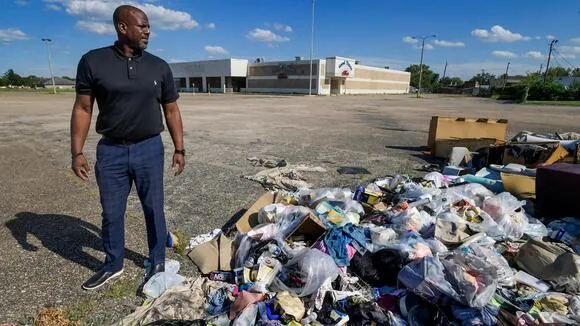After being taken on a tour of his district, the most financially strained in the county, by Montgomery County Commissioner Isaiah Sankey, Deborah Neal became invested in the cause to reduce blight.
Neal expressed his shock and dismay when he laid eyes on the rundown neighborhoods, reminiscent of those found in third-world countries. He couldn’t believe the number of boarded-up homes and dilapidated properties that people were living in, with no proper sewer drainage for water runoff. It felt like he had been transported back in time, perhaps 50 or 60 years, when he saw the state of these areas.
Having spent his childhood in Newtown, Sankey has a profound understanding of the problem of blight in Montgomery communities. He strongly advocates for the implementation of effective measures by the city and county to put an end to this issue.
Montgomery’s city estimates reveal that around 800 properties in the area are currently blighted, which is a cause of concern for a group of citizens who are determined to see a positive transformation.
According to various sources, including the Public Health Post and the Manhattan Institute, blight has been found to attract criminal activity and have negative impacts on the physical and mental health of those living in its vicinity. Additionally, blight has been linked to decreasing property values.
It is Neal’s fervent desire to witness the city implement a comprehensive revitalization strategy that entails collaboration between the public and private sectors to tackle these properties.
According to Sankey’s suggestion, the duo could utilize funds from the American Rescue Plan Act to tackle the issue, alongside implementing the existing city laws that are already in place.
One of his proposals involved creating a land bank to manage the abandoned properties. This would allow interested individuals to purchase properties and renovate them, or for the city to donate them to non-profit organizations. The abandoned properties could also be repurposed and transformed into community gardens or small parks for the benefit of local residents.
City Initiative
Councilor Oronde Mitchell of Montgomery is looking to establish the foundation for a fresh approach.
In his efforts to combat blight, he aims to establish a clearly defined ordinance. He emphasizes the importance of having a clear definition, as it enables people to properly enforce laws related to blight. Without such clarity, the enforcement of blight-related laws becomes a challenging task.
Advocating for a bill before the Alabama Legislature, Mitchell is pushing for the creation of a blight review board. The proposed board would require property owners with blighted properties to present a plan of action to address the issue for review. This approach aims to combat blight in the state and encourage property owners to take responsibility for their properties.
Blight is a major concern for Michael Jackson, the president of the Bell Mead and Spring Neighborhood Association in Mitchell’s district. He is constantly frustrated by the amount of trash that accumulates in the area due to blight. It’s common to see people dumping unwanted items and furniture around these blighted areas, which only adds to the problem.
Jackson expressed his concern about how the presence of the issue is affecting their community’s appearance. “It’s out in front of our community making us look like we aren’t cleaning,” he stated.
According to Kippy Tate, the chief building official of the city, the current administration led by Mayor Steven Reed is taking steps to address the long-standing issue of neglect.
According to Tate, the city has devised a strategic plan to combat blight and it involves a phased approach. As part of this plan, several commercial properties including the South Court Street Apartments and the Boys and Girls Club Annex will be demolished. The second phase of the project is aimed at preventing blight at the intersection of South Boulevard and Interstate 65, which serves as a key entrance to the city.
According to Tate, the aim is to break free from the never-ending cycle of decay and neglect.
Before the city can proceed with the demolition of certain properties, there are additional processes that need to be followed. Take for instance, the North Gate Apartments, which have been approved for demolition by the city. However, federal approval must first be obtained before any steps can be taken towards the actual demolition process.
According to Tate, he has a strong desire to eliminate blight from the city as he considers it to be his own and has no intention of leaving it.
Inherited Properties
Upon gaining a deeper understanding of the issue at hand, Neal delved into research and uncovered a distressing reality – inherited properties posed a significant challenge for communities of color. The crux of the problem lies in the fact that when individuals pass on their homes to their heirs, the latter may not have the financial resources to maintain and sustain the property. This situation results in a multitude of issues that can have far-reaching implications.
Andriette Rowell, a managing attorney for Legal Services Alabama, is determined to help people avoid the issue of leaving their heirs’ property behind. The organization is actively educating individuals on the steps they can take to prevent this problem from arising. For more information on how to avoid this issue, visit their website at the link provided.
The organization has a specialized lawyer who focuses on handling inherited properties. Furthermore, the organization offers educational clinics to help individuals understand the necessary steps they can take in avoiding the inheritance of a property by multiple people. These steps include creating wills, which can help individuals ensure that their property is inherited by their intended beneficiaries.
The problem mentioned above can potentially lead to a significant loss of property, which can negatively affect the generational wealth of individuals or families involved.
Rowell emphasized the importance of education by saying, “That’s why I believe that education is the key.”



